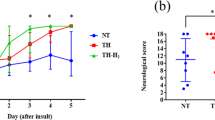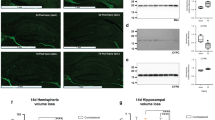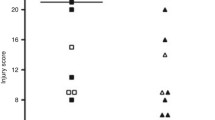Abstract
Hypothermia (HT) is a well-established neuroprotective strategy against neonatal hypoxic ischemic encephalopathy (HIE). The overexpression of heat shock proteins (HSP) has been shown to provide neuroprotection in animal models of stroke. We aimed to investigate the effect of HT on HSP70 and HSP27 expression in a neonatal rat model of HIE. Seven-day-old rat pups were exposed to hypoxia for 90 min to establish the Rice-Vannucci model and were assigned to the following four groups: hypoxic injury (HI)-normothermia (NT, 36 °C), HI-HT (30 °C), sham-NT, and sham-HT. After temperature intervention for 24 h, the mRNA and protein expression of HSP70 and HSP27 were measured. The association between HSP expression and brain injury severity was also evaluated. The brain infarct size was significantly smaller in the HI-HT group than in the HI-NT group. The mRNA and protein expression of both HSPs were significantly greater in the two HI groups, compared to those in the two sham groups. Moreover, among the rat pups subjected to HI, HT significantly reduced the mRNA and protein expression of both HSPs. The mRNA expression level of the HSPs was proportional to the brain injury severity. Post-ischemic HT, i.e., a cold shock attenuated the expression of HSP70 and HSP27 in a neonatal rat model of HIE. Our study suggests that neither HSP70 nor HSP27 expression is involved in the neuroprotective mechanism through which prolonged HT protects against neonatal HIE.





Similar content being viewed by others
References
Aoe T, Inaba H, Kon S, Imai M, Aono M, Mizuguchi T, Saito T, Nishino T (1997) Heat shock protein 70 messenger RNA reflects the severity of ischemia/hypoxia-reperfusion injury in the perfused rat liver. Crit Care Med 25(2):324–329
Chen S, Brown IR (2007) Neuronal expression of constitutive heat shock proteins: implications for neurodegenerative diseases. Cell Stress Chaperones 12(1):51–58
Chopp M, Li Y, Dereski MO, Levine SR, Yoshida Y, Garcia JH (1991) Neuronal injury and expression of 72-kDa heat-shock protein after forebrain ischemia in the rat. Acta Neuropathol 83(1):66–71
Chopp M, Li Y, Dereski MO, Levine SR, Yoshida Y, Garcia JH (1992) Hypothermia reduces 72-kDa heat-shock protein induction in rat brain after transient forebrain ischemia. Stroke 23(1):104–107
Cizkova D, Carmel JB, Yamamoto K, Kakinohana O, Sun D, Hart RP, Marsala M (2004) Characterization of spinal HSP72 induction and development of ischemic tolerance after spinal ischemia in rats. Exp Neurol 185(1):97–108
Currie RW, Ellison JA, White RF, Feuerstein GZ, Wang X, Barone FC (2000) Benign focal ischemic preconditioning induces neuronal Hsp70 and prolonged astrogliosis with expression of Hsp27. Brain Res 863(1–2):169–181
Dienel GA, Kiessling M, Jacewicz M, Pulsinelli WA (1986) Synthesis of heat shock proteins in rat brain cortex after transient ischemia. J Cereb Blood Flow Metab 6(4):505–510
Doeppner TR, Nagel F, Dietz GP, Weise J, Tonges L, Schwarting S, Bahr M (2009) TAT-Hsp70-mediated neuroprotection and increased survival of neuronal precursor cells after focal cerebral ischemia in mice. J Cereb Blood Flow Metab 29(6):1187–1196
Dwyer BE, Nishimura RN (1992) Heat shock proteins in hypoxic-ischemic brain injury: a perspective. Brain Pathol 2(3):245–251
Ferriero DM (2004) Neonatal brain injury. N Engl J Med 351(19):1985–1995
Ferriero DM, Soberano HQ, Simon RP, Sharp FR (1990) Hypoxia-ischemia induces heat shock protein-like (HSP72) immunoreactivity in neonatal rat brain. Dev Brain Res 53(1):145–150
Franklin TB, Krueger-Naug AM, Clarke DB, Arrigo AP, Currie RW (2005) The role of heat shock proteins Hsp70 and Hsp27 in cellular protection of the central nervous system. Int J Hyperth 21(5):379–392
Fujita J (1999) Cold shock response in mammalian cells. J Mol Microbiol Biotechnol 1(2):243–255
Gonzalez MF, Lowenstein D, Fernyak S, Hisanaga K, Simon R, Sharp FR (1991) Induction of heat shock protein 72-like immunoreactivity in the hippocampal formation following transient global ischemia. Brain Res Bull 26(2):241–250
Holland DB, Roberts SG, Wood EJ, Cunliffe WJ (1993) Cold shock induces the synthesis of stress proteins in human keratinocytes. J Invest Dermatol 101(2):196–199
Joly A-L, Wettstein G, Mignot G, Ghiringhelli F, Garrido C (2010) Dual role of heat shock proteins as regulators of apoptosis and innate immunity. Journal of innate immunity 2(3):238–247
Kaneko T, Kibayashi K (2012) Mild hypothermia facilitates the expression of cold-inducible RNA-binding protein and heat shock protein 70.1 in mouse brain. Brain Res 1466:128–136
Kato H, Kogure K, Liu XH, Araki T, Kato K, Itoyama Y (1995) Immunohistochemical localization of the low molecular weight stress protein HSP27 following focal cerebral ischemia in the rat. Brain Res 679(1):1–7
Kinouchi H, Sharp FR, Hill MP, Koistinaho J, Sagar SM, Chan PH (1993a) Induction of 70-kDa heat shock protein and hsp70 mRNA following transient focal cerebral ischemia in the rat. J Cereb Blood Flow Metab 13(1):105–115
Kinouchi H, Sharp FR, Koistinaho J, Hicks K, Kamii H, Chan PH (1993b) Induction of heat shock hsp70 mRNA and HSP70 kDa protein in neurons in the ‘penumbra’ following focal cerebral ischemia in the rat. Brain Res 619(1–2):334–338
Lanneau D, Wettstein G, Bonniaud P, Garrido C (2010) Heat shock proteins: cell protection through protein triage. Sci World J 10:1543–1552
Lee JE, Yenari MA, Sun GH, Xu L, Emond MR, Cheng D, Steinberg GK, Giffard RG (2001) Differential neuroprotection from human heat shock protein 70 overexpression in in vitro and in vivo models of ischemia and ischemia-like conditions. Exp Neurol 170(1):129–139
Lee SH, Kwon HM, Kim YJ, Lee KM, Kim M, Yoon BW (2004) Effects of hsp70.1 gene knockout on the mitochondrial apoptotic pathway after focal cerebral ischemia. Stroke 35(9):2195–2199
Lee BS, Woo CW, Kim ST, Kim KS (2010) Long-term neuroprotective effect of postischemic hypothermia in a neonatal rat model of severe hypoxic ischemic encephalopathy: a comparative study on the duration and depth of hypothermia. Pediatr Res 68(4):303–308
Li Q, Nakano Y, Shang J, Ohta Y, Sato K, Takemoto M, Hishikawa N, Yamashita T, Abe K (2016) Temporal profiles of stress protein inductions after focal transient ischemia in mice brain. J Stroke Cerebrovasc Dis 25(10):2344–2351
Liu AY, Bian H, Huang LE, Lee YK (1994) Transient cold shock induces the heat shock response upon recovery at 37 degrees C in human cells. J Biol Chem 269(20):14768–14775
Lowenstein DH, Simon RP, Sharp FR (1990) The pattern of 72-kDa heat shock protein-like immunoreactivity in the rat brain following flurothyl-induced status epilepticus. Brain Res 531(1–2):173–182
Lu A, Ran R, Parmentier-Batteur S, Nee A, Sharp FR (2002) Geldanamycin induces heat shock proteins in brain and protects against focal cerebral ischemia. J Neurochem 81(2):355–364
Matsumori Y, Hong SM, Aoyama K, Fan Y, Kayama T, Sheldon RA, Vexler ZS, Ferriero DM, Weinstein PR, Liu J (2005) Hsp70 overexpression sequesters AIF and reduces neonatal hypoxic/ischemic brain injury. J Cereb Blood Flow Metab 25(7):899–910
Paxinos G, Watson C (1998) The rat brain in sterotaxic coordinates. Academic Press, San Diego
Plumier JC, Krueger AM, Currie RW, Kontoyiannis D, Kollias G, Pagoulatos GN (1997) Transgenic mice expressing the human inducible Hsp70 have hippocampal neurons resistant to ischemic injury. Cell Stress Chaperones 2(3):162–167
Rajdev S, Hara K, Kokubo Y, Mestril R, Dillmann W, Weinstein PR, Sharp FR (2000) Mice overexpressing rat heat shock protein 70 are protected against cerebral infarction. Ann Neurol 47(6):782–791
Rice JE 3rd, Vannucci RC, Brierley JB (1981) The influence of immaturity on hypoxic-ischemic brain damage in the rat. Ann Neurol 9(2):131–141
Robertson NJ, Tan S, Groenendaal F, van Bel F, Juul SE, Bennet L, Derrick M, Back SA, Valdez RC, Northington F, Gunn AJ, Mallard C (2012) Which neuroprotective agents are ready for bench to bedside translation in the newborn infant? J Pediatr 160(4):544–552 e544
Shankaran S (2012) Hypoxic-ischemic encephalopathy and novel strategies for neuroprotection. Clin Perinatol 39(4):919–929
Sharp FR, Lowenstein D, Simon R, Hisanaga K (1991) Heat shock protein hsp72 induction in cortical and striatal astrocytes and neurons following infarction. J Cereb Blood Flow Metab 11(4):621–627
Sharp FR, Kinouchi H, Koistinaho J, Chan PH, Sagar SM (1993) HSP70 heat shock gene regulation during ischemia. Stroke 24(12 Suppl):I72–I75
Sharp FR, Lu A, Tang Y, Millhorn DE (2000) Multiple molecular penumbras after focal cerebral ischemia. J Cereb Blood Flow Metab 20(7):1011–1032
Sonna LA, Fujita J, Gaffin SL, Lilly CM (2002) Invited review: effects of heat and cold stress on mammalian gene expression. J Appl Physiol 92(4):1725–1742
Sonna LA, Kuhlmeier MM, Carter HC, Hasday JD, Lilly CM, Fairchild KD (2006) Effect of moderate hypothermia on gene expression by THP-1 cells: a DNA microarray study. Physiol Genomics 26(1):91–98
Stetler RA, Gao Y, Signore AP, Cao G, Chen J (2009) HSP27: mechanisms of cellular protection against neuronal injury. Curr Mol Med 9(7):863–872
Swanson RA, Morton MT, Tsao-Wu G, Savalos RA, Davidson C, Sharp FR (1990) A semiautomated method for measuring brain infarct volume. J Cereb Blood Flow Metab 10(2):290–293
Terao Y, Miyamoto S, Hirai K, Kamiguchi H, Ohta H, Shimojo M, Kiyota Y, Asahi S, Sakura Y, Shintani Y (2009) Hypothermia enhances heat-shock protein 70 production in ischemic brains. Neuroreport 20(8):745–749
Tsuchiya D, Hong S, Matsumori Y, Shiina H, Kayama T, Ra S, Dillman WH, Liu J, Panter SS, Weinstein PR (2003) Overexpression of rat heat shock protein 70 is associated with reduction of early mitochondrial cytochrome C release and subsequent DNA fragmentation after permanent focal ischemia. J Cereb Blood Flow Metab 23:718–727
van der Weerd L, Lythgoe MF, Badin RA, Valentim LM, Akbar MT, de Belleroche JS, Latchman DS, Gadian DG (2005) Neuroprotective effects of HSP70 overexpression after cerebral ischaemia—an MRI study. Exp Neurol 195(1):257–266
van der Weerd L, Tariq Akbar M, Aron Badin R, Valentim LM, Thomas DL, Wells DJ, Latchman DS, Gadian DG, Lythgoe MF, de Belleroche JS (2010) Overexpression of heat shock protein 27 reduces cortical damage after cerebral ischemia. J Cereb Blood Flow Metab 30(4):849–856
Zhan X, Ander BP, Liao IH, Hansen JE, Kim C, Clements D, Weisbart RH, Nishimura RN, Sharp FR (2010) Recombinant Fv-Hsp70 protein mediates neuroprotection after focal cerebral ischemia in rats. Stroke 41(3):538–543
Acknowledgements
This research was supported by a Grant (10-465) from the Asan Institute for Life Sciences, Seoul, Korea.
Author information
Authors and Affiliations
Corresponding author
Rights and permissions
About this article
Cite this article
Lee, B.S., Jung, E., Lee, Y. et al. Hypothermia decreased the expression of heat shock proteins in neonatal rat model of hypoxic ischemic encephalopathy. Cell Stress and Chaperones 22, 409–415 (2017). https://doi.org/10.1007/s12192-017-0782-0
Received:
Revised:
Accepted:
Published:
Issue Date:
DOI: https://doi.org/10.1007/s12192-017-0782-0




